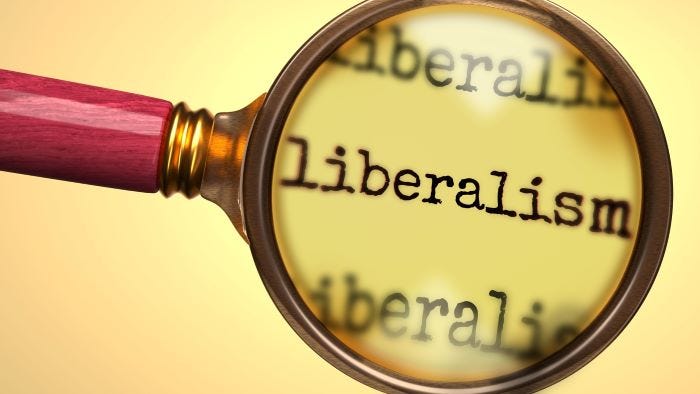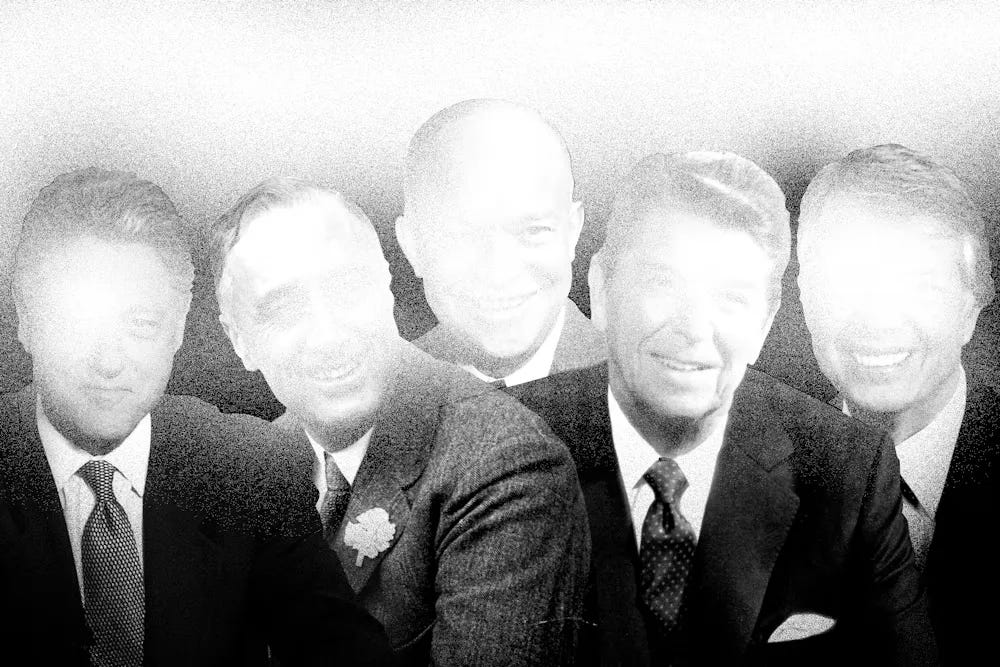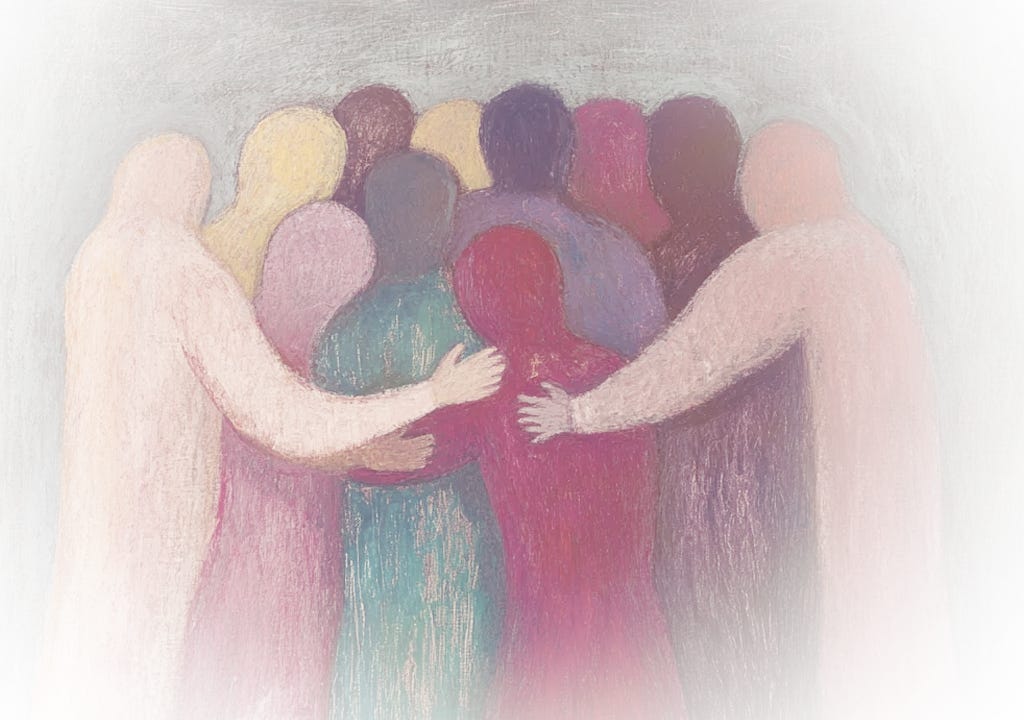The Lonely Side of Liberalism
No one ever told us freedom would feel like this.
For decades, liberalism (in its original sense) has dominated the political and cultural consensus in America, promising liberty, tolerance, and individual rights. Though may factions have been borne from its beginnings, the principles have mostly stayed the same. Liberalism’s ideas won the Revolution, both World Wars, the Cold War, the Great Depression, and shaped our institutions, molding the society most young people inherited. But beneath the victories and the rhetoric lies a growing void: a nation fraying at the seams, where millions — especially the young — are disconnected, distrustful, and deeply alone.
This isn’t just a failure of technology or social media. It’s a deeper, more personal betrayal. It’s what happens when you tell a generation that freedom and happiness is a solo project. Liberalism told us to be ourselves, to chart our own paths, to escape constraint — but it rarely asked what we owed one another in the process. This promise of freedom became, for many, a slow unraveling of solidarity, where the only constant is choice, and the only destination is isolation. The pursuit of unrestrained individualism creates a social desert, one where obligations to others feel like burdens rather than bonds.
This is the paradox of our politics: even as we win more rights and freedoms, we lose the sense of solidarity that once bound people together. And in that vacuum, apathy, extremism, and despair fester. For many working- and middle-class Americans, this freedom feels less like empowerment and more like abandonment.
The Symptoms: Loneliness, Distrust, and the Collapse of Belonging
Millennials and Gen Z are the most connected generations in history, but we are also the loneliest. Rates of depression, anxiety, and isolation have exploded over the past two decades. Trust in institutions has cratered. Participation in traditional forms of community — churches, unions, civic groups — continues to decline. Politics, instead of offering collective purpose, often feels like a never-ending spectacle of outrage, cable news theatrics, and algorithmically-amplified conflict. Rage bait.
We watch politicians posture on social media to score points and provoke reactions. Campaigns are run like influencer brands. Governing is replaced by grievance. It’s not about building something together — it’s about winning the next viral moment, getting the next big donor, winning the next election. For those looking for real connection or community, it feels hollow, sometimes even hostile. We scroll endlessly, but rarely feel seen. We speak constantly, but rarely feel heard.
Much of this is blamed on technology, and not without reason. In an era where social media is now the number one outlet people go to for news, entertainment, learning, and friendship, it’s easy to see why the decline in third spaces has been happening in the first place. What’s possibly more alarming is the increasing reliance on AI — mostly ChatGPT — for nearly every aspect of daily life: processing information, writing emails, getting opinions on a type of food, balancing a ledger, companionship, even therapy. The problem is certainly exacerbated with technology, but it’s not the underlying cause.
The deeper culprit is cultural: we are raised in a system that prizes self-fulfillment and personal profit over shared responsibility. We were told to follow our dreams, but rarely to invest in our neighborhoods. We were taught to distrust authority, but not to build alternatives. The result is a generation caught between hyper-individualism and a gnawing desire for connection — even if they don’t realize it. This began to happen all around the same time period across many liberal democratic countries, and this new liberalism — or neoliberalism — still shapes the way that modern center-right parties and most voters think and feel in the Western world about society. It’s a system built on not just life, liberty, and the pursuit of happiness (or as John Locke put it, '“pursuit of property”), but the maximization of each — for better or worse.
Neoliberalism in particular reframed every aspect of life as a matter of personal choice — education, health care, even relationships. The story we’ve been sold was that if you work hard and make the right choices, you’ll inevitably succeed. It’s the “American Dream” (TM). If you don’t, that’s on you. In a ideologically ascetic conservative world (where you aren’t worth your salt unless you can pull yourselves up by your bootstraps) this is a rampant sentiment. Loneliness became a private failing, not a public concern. The communal has turned transactional. The neighbor became a competitor. And when everything is optional and nothing is sacred, alienation becomes the default setting.
Ask any working-class parent trying to raise a kid on two jobs and no daycare, or any young adult drowning in student debt with no path to home ownership. The message to them — and the rest of us — is clear: you're on your own. Abandonment dressed up in the language of choice.
The Roots: How “Liberalism” Got Us Here
Classical liberalism was born as a rebellion against hierarchy, monarchy, and religious dogma. It was an engine of emancipation. But it also laid the groundwork for a society of individuals rather than communities. The 20th-century turn toward neoliberalism only accelerated this: markets over morals, choice over cohesion, the consumer over the citizen. What began as liberation gradually morphed into fragmentation.
Neoliberalism didn't just deregulate markets — it deregulated social bonds. The idea of society as a collective endeavor gave way to the ideal of the self-made individual. Public institutions were hollowed out. Solidarity was rebranded as inefficiency. Even progressive liberalism, with its emphasis on rights and inclusion, has often failed to offer a thick sense of belonging. While it has expanded legal protections and amplified historically marginalized voices, it frequently stops just short of fostering durable communal bonds or shared purpose.
Many progressive victories feel procedural or symbolic, not transformative or truly revolutionary. Movements like Occupy Wall Street or the Sanders campaigns hinted at a more solidarity-based politics, but lacked the institutional staying power to sustain that vision. More recently the “No Kings” protests, while extremely visible and successful in their presence, did not actually accomplish anything aside from that visibility.
In practice, progressive liberalism often mirrors the same atomizing tendencies as its neoliberal cousins — prioritizing expressive individualism and cultural visibility over embeddedness, responsibility, and relational depth. The result is a politics that can win headlines, but struggles to make real systemic change. Identity becomes a personal brand, both for activists and politicians. In this framework, solidarity is fragile, because it relies on agreement rather than if the shared struggle is worth it.
The net result is a civic vacuum, where common life is thin and contested. We are freer than ever to be ourselves, but less sure than ever of who "we" are. In this lonely order, belonging is scarce, and politics becomes a search for meaning as much as a contest for power, a search that many people will find that political candidates, campaigns, and movements are ill-equipped to fulfill.
And that vacuum doesn’t just hurt our politics, it shapes our economy. Workers are treated like gig-based commodities, when they should be treated like community members — because they are. Young people are told to adapt to the current instability of our society rather than fight for stability, and those who can’t keep up with the churn are blamed for their own struggle. This is liberalism without a net, a freedom that assumes you’ll never fall as long as you keep your nose on the grindstone, and never look up and see the reality of your material surroundings.
The Response: Toward a Politics of Belonging
If (neo)liberalism made us lonely, the left could now make us whole, whereas a shift to the right would simply exacerbate the problems we have now. Conservatism traffics in nostalgia and hierarchy. Its answer to alienation is submission: to patriarchal families, racial exclusion, or nationalist myth. And of course, these are different levels of “conservatism”, but they exist all the same). It offers the illusion of community without any of the liberation.
The left wing’s task isn’t to retreat to the past, but instead to chart a future rooted in shared power. That doesn’t mean abandoning freedom. It means reimagining it as power with others beyond the bounds of individualism. In a neoliberal age that told us self-reliance was enough, this kind of freedom insists that dignity comes not from detachment, but from relationship. Real freedom is not solitary. It’s shared. It’s found not in the absence of obligation, but in the presence of mutual care. It means building institutions that people don’t just vote for, but live in. It means fighting for material security and social solidarity, not through charity or coercion, but through democracy.
If you do not believe this to be true, and yet hail the glorious deeds of America’s founding fathers, then you have missed the very essence of their success in revolution. It’s actually quite simple:
United we stand. Divided we fall.
A post-liberal left must reassert the value of commitment to each other. That commitment needs to be rooted in a recognition that the neoliberal project hollowed out our lives from top to bottom (though the “top” seems to fairing just fine… I wonder why). Neoliberalism sold us autonomy as self-reliance and turned social bonds into market exchanges. Now we’re left with a society of consumers, not citizens — freedom without fellowship.
We need a politics that doesn’t just protect individual rights but actively reconstructs the social fabric neoliberalism unraveled, one that replaces market logic with civic care and recognizes that real freedom requires a sense of belonging, not just the absence of restraint. This might look like local mutual aid networks, democratic unions, housing co-ops, or multiracial parties rooted in place. It means telling stories that bind us together, not just set us apart — and living lives that remind us we’re not alone.
Take for example the Chicago Teachers Union, which built a broad multiracial coalition by anchoring labor demands in neighborhood needs like affordable housing, wraparound services, and safe transit. Or look to Cooperation Jackson in Mississippi, a Black-led grassroots network that blends community land trusts with worker cooperatives and political education. These could be our models of belonging.
Call it socialism, communism, co-ops, community organizing, whatever floats your boat. Neoliberalism left us with choice without community, autonomy without anchor. Rebuilding belonging will require rejecting the idea that every social tie is a form of constraint. The liberal project gave us many of the tools we now wield. But if we want to build something that lasts — something that heals our isolation and empowers our generation — we will need to move beyond it.
Not just more freedom, more belonging.





